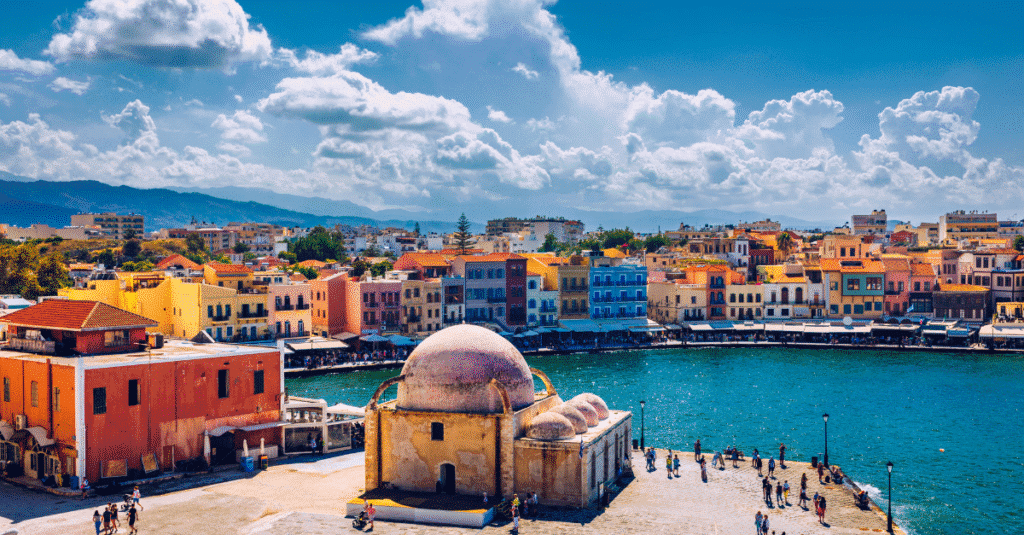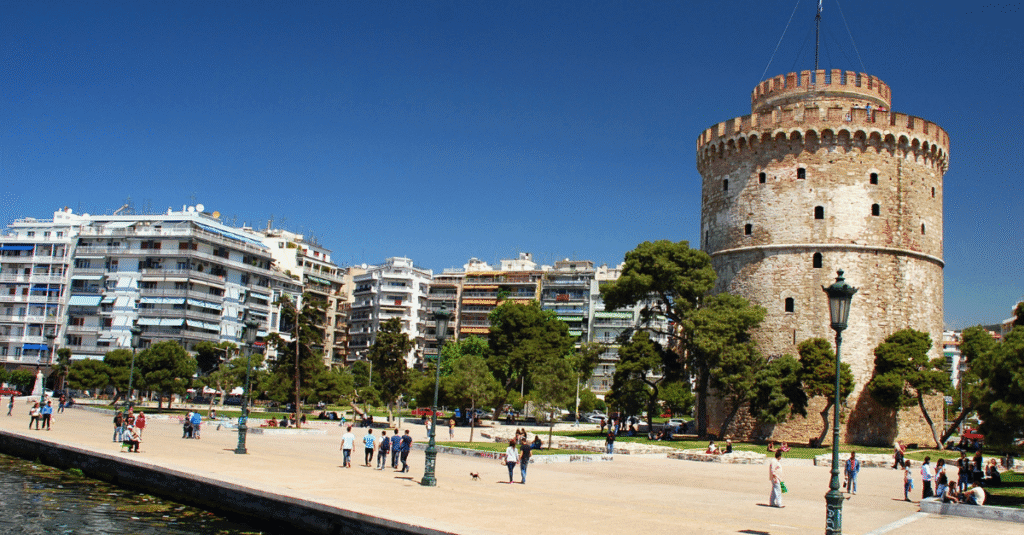Greece continues to inspire travelers and expats alike with its stunning landscapes, warm Mediterranean climate, and rich cultural heritage. From historic ruins and island sunsets to a slower, more relaxed pace of life. It’s easy to see why so many people dream of calling Greece home.
But before packing your bags, it’s worth understanding the pros and cons of living in Greece in 2025. While daily life here can feel idyllic, it also comes with its fair share of challenges.
This guide breaks down what to expect for those considering how to live in Greece as a retiree, remote worker, or long-term expat. We’ll look at everything from healthcare and community to the cost of living in Greece, so you can decide whether Greece is truly the right fit for your lifestyle.
If you’ve ever wondered, “Is Greece a good place to live?”, this is your realistic, up-to-date answer.
Table of Contents
The Top Reasons to Live in Greece
When weighing the pros and cons of living in Greece, it’s easy to see why so many expats fall in love with this Mediterranean gem. With year-round sunshine, friendly locals, and a relaxed pace of life, Greece offers an irresistible mix of lifestyle and affordability.
Whether you’re retiring in Greece, working remotely, or just curious about how to live in Greece, there are many reasons why the country continues to attract people from around the world.
Low Cost of Living
One of the biggest advantages of life here is the cost of living in Greece, which is among the lowest in Western Europe.
- A single person can live comfortably on €800-€1,200 per month (excluding rent).
- A family of four typically spends €2,700-€3,500 monthly.
Rent is particularly affordable, often 50-70% lower than in major U.S. cities. This makes Greece especially attractive for retirees, families, and digital nomads seeking a high quality of life at a lower price.
Excellent Climate and Lifestyle
For culture lovers, Greece is unmatched. As the birthplace of European civilization, it’s filled with UNESCO World Heritage Sites like the Acropolis in Athens and the ruins of Delphi. But culture here isn’t limited to history. Modern Greece celebrates life through festivals, food, and tradition. For expats, this blend of old and new makes Greece both fascinating and deeply welcoming.
Rich Culture and History
For culture lovers, Greece offers endless inspiration. The country’s history stretches back more than 5,000 years, and is considered the birthplace of European civilization. You’ll find 18 UNESCO World Heritage Sites, including the Acropolis in Athens, the ancient ruins of Delphi and the medieval city of Rhodes.
Beyond its monuments, modern Greece remains deeply connected to its cultural roots, with lively festivals, music, and traditions celebrated year-round.
Affordable and Accessible Healthcare
Healthcare is another major advantage, especially for those evaluating retiring in Greece pros and cons. The country provides universal public healthcare (ESY) with free or low-cost access to residents.
Private healthcare is also affordable, typically costing €50-€150 per month. Emergency services are available to everyone, regardless of nationality, giving expats peace of mind and excellent value.
Friendly Locals & Welcoming Expat Communities
Greeks are known for their warmth and hospitality. Whether you’re settling in Athens, Thessaloniki, or one of the islands, it’s easy to build connections. Established expat groups help newcomers adjust and find community quickly. Many who ask, “Is Greece a good place to live?” soon discover that its people are what make it special.
From its low cost of living in Greece to its stunning scenery and supportive communities, this country offers something for everyone. Whether you’re looking for the best places to live in Greece as an expat or considering your long-term move, the pros are hard to overlook.
If you’re ready to move but aren’t sure where to start, we’ve compiled the top routes to simplify your relocation. Explore your options with Lexidy’s Immigration Services in Greece
and find the pathway that fits your lifestyle and goals.
The Disadvantages of Living in Greece

While the pros and cons of living in Greece often lean toward the positive, it’s important to understand the challenges before making a long-term move. Knowing the disadvantages of living in Greece helps expats prepare and make informed decisions about daily life abroad.
Bureaucracy and Administrative Hurdles
Bureaucracy is one of the biggest frustrations for expats living in Greece. Tasks like applying for a visa, registering as a resident, or opening a bank account can involve long queues, multiple offices, and plenty of paperwork. Processes often move slowly, and online systems can be unreliable.
Seeking professional guidance can help you navigate the administrative side of how to live in Greece more smoothly. Fill out the form below to book a free consultation with one of our legal experts.
Job Market and Lower Salaries
The Greek job market can be challenging, particularly for foreigners without strong Greek language skills. While opportunities exist in tourism, teaching, and remote work, local salaries are modest. The average monthly income is around €934, which is considerably lower than in Northern Europe.
For this reason, Greece is better suited for remote workers, entrepreneurs, and retirees with external income streams rather than those relying solely on local employment.
Language Barrier
English is widely spoken in major cities and tourist hubs. But, in smaller towns or during official procedures, Greek becomes essential. Many expats find that learning at least conversational Greek improves their quality of life.
Without it, even simple daily interactions, such as handling healthcare or banking, can become difficult. Understanding this language challenge is a key part of evaluating the pros and cons of living in Greece.
Summer Crowds and Extreme Heat
While the climate is one of Greece’s biggest draws, the summer months can bring intense heat and heavy tourism. In July and August, temperatures often exceed 40°C (104°F), particularly in southern regions and cities like Athens.
Popular islands such as Santorini, Mykonos, and Crete can also feel overcrowded during peak season. Choosing one of the best places to live in Greece as an expat, such as quieter coastal towns or inland villages, can help avoid the crowds while still enjoying the sunshine.
Economic Challenges
Although Greece’s economy has recovered in recent years, wages remain low and small businesses often face high taxes and administrative barriers. Public services may also be underfunded in some areas. While these challenges rarely affect retirees or remote professionals with international income, they’re worth considering when weighing the disadvantages of living in Greece for the long term.
Understanding both the pros and cons of living in Greece ensures that your expectations align with reality. By knowing what to anticipate, from bureaucracy to budgeting, you’ll be better prepared to decide whether living in Greece suits your lifestyle and goals.
Best Places to Live in Greece for Expats
Choosing where to settle is one of the most exciting parts of moving abroad. Greece offers an incredible variety of destinations, from lively urban centers to tranquil island escapes.
Whether you’re a retiree, a digital nomad, or a family looking to relocate, here are some of the best places to live in Greece for expats, each offering its own mix of charm, affordability, and lifestyle benefits.
Athens: The Cultural and Economic Hub

Athens, Greece’s capital, blends ancient history with modern convenience. It’s ideal for those who want to stay connected to international business, cultural events, and an active expat community. The cost of living in Athens is generally lower than in other European capitals.
Excellent public transport, English-speaking professionals, and endless restaurants, museums, and theaters make it a top choice for long-term residents.
Crete: Family-Friendly and Affordable Island Life

Crete, the largest Greek island, is perfect for those craving space, sunshine, and a slower pace. It’s one of the best places to live in Greece as an expat thanks to its combination of natural beauty, affordability, and established expat communities in Chania and Heraklion.
The cost of living is lower here than in Athens, and locals are famously welcoming. With modern infrastructure, international schools, and year-round mild weather, Crete is ideal for both families and retirees.
Thessaloniki: Young, Vibrant, and Affordable

Thessaloniki, Greece’s second-largest city, offers a more relaxed and youthful atmosphere compared to Athens. It’s popular with students, entrepreneurs, and remote workers who value community and affordability.
The city’s lively food scene, seafront promenade, and creative energy make it one of the most underrated reasons to live in Greece. It’s also far less crowded than the capital while offering excellent connectivity and cultural diversity.
Corfu: Nature, Peace, and an English-Speaking Community

Corfu is a favorite among retirees and expats seeking a peaceful island life with a strong sense of community. The island’s lush green landscapes, Venetian architecture, and English-speaking population make integration easy.
Known for its welcoming locals and reliable healthcare, Corfu is often highlighted when comparing the pros and cons of living in Greece. It’s quieter in winter but perfect for year-round living if you prefer nature, beaches, and a slower rhythm.
From Athens’ energy to Crete’s balance, Thessaloniki’s creativity, and Corfu’s serenity, Greece truly offers something for everyone. The pros and cons of living in Greece vary by location, but the country’s affordability, climate, and quality of life remain consistent wherever you choose to settle.
Conclusion: Is Greece a Good Place to Live?
Living in Greece offers a rare balance of sunshine, culture, and affordability that continues to attract expats from around the world. Whether you dream of island life or a city steeped in history, Greece delivers a lifestyle rooted in community and wellbeing, making it one of the most appealing places to relocate in Europe.
That said, building a life here takes planning. Understanding visas, residence permits, and long-term requirements is essential for anyone learning how to live in Greece. These steps ensure your move isn’t just a dream but a sustainable, stress-free reality.
If you’re ready to take the next step toward living in Greece, having expert legal guidance can make the process far smoother. The immigration lawyers at Lexidy help expats and investors every day, handling everything from visa applications to residence renewals with clarity and care.
Start your journey today by connecting with Lexidy’s Immigration Team in Greece. Fill out the form below, and one of our friendly legal experts will reach out to guide you on your path to Mediterranean living.

